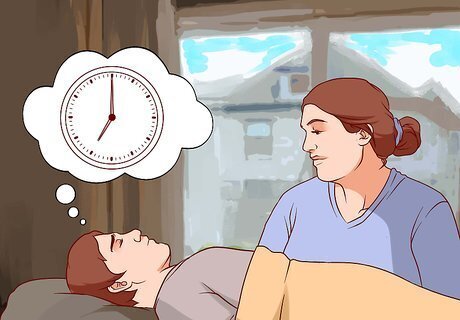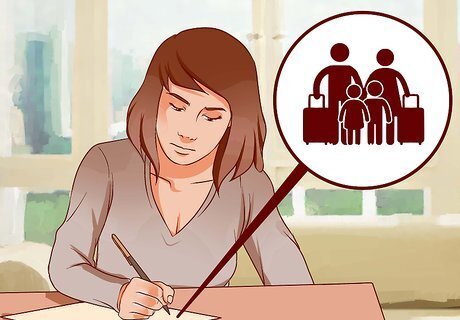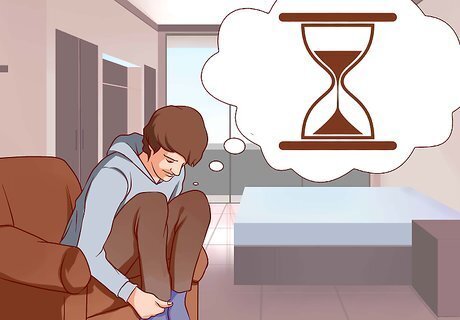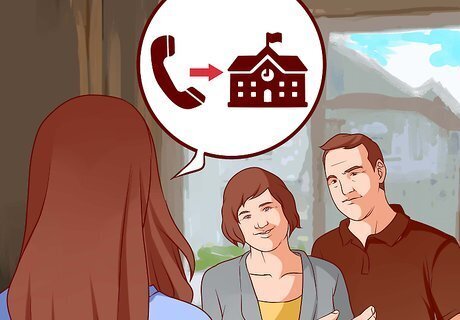
views
Faking It

Start the act ahead of time. Your parents are more likely to believe you when you wake up and claim to be sick if you lay the groundwork the night before. The sooner you can start your act, the more time you have to allow it to progress. Show a little fatigue the afternoon before you plan to fake your illness. For instance, instead of running around outside when you get home from school, choose to stay inside and laze around your room instead. Act lethargic around your parents. They should get the impression that you are tired or "feeling out of it." In the evening, don’t follow your normal routine. If you watch T.V. at all, lay down and look disinterested and mopey. You should also go to bed early and make sure your parents notice. Consider kicking things up a notch by eating a little less at dinner or pretending to attempt to eat, then clutching your stomach and looking pained. Claim that you don’t feel well. Definitely skip dessert. You also might ask your parent for some hot tea to “soothe your stomach.” Tell your parents that a kid at school projectile vomited or that a friend wasn’t at school. Be sure this is a friend that your parents don’t know. This information will suggest that something is “going around.”

Exhibit symptoms. Outwardly visible symptoms, such as a rash, can be hard to fake convincingly, so for the most part, you should focus on displaying external signs of internal aches and pains. Frequent trips to the bathroom can give the impression that you have a stomach bug. Jumping up quickly, running into the bathroom periodically, and flushing the toilet a lot will suggest to your parents that you have diarrhea or food poisoning. If you decide to fake a migraine, you should act sensitive to light and sound, indicate that your head feels like it is throbbing, and claim to be nauseous. You should avoid watching T.V. or listening to music. To fake a sore throat, act like it hurts to swallow and ask your parents for warm tea or cold foods. Suck on a few cough drops and avoid talking as much as possible, insisting that it hurts to do so when asked why you are being so quiet. Consider faking a few coughing fits, as well. Indicate that your symptoms developed throughout the night. You should start your coughing fits or trips to the bathroom sometime between midnight and 6:00 AM.

Be subtle yet convincing. One of the biggest mistakes you can make is to put a little too much into your acting. If you are too dramatic about your pretend illness, your parents are actually more likely to see through your act. It is generally a better idea to fake a simple illness rather than faking an illness that requires evidence. Mimicking the sound or appearance of vomit, for instance, is a risky move since your parents might catch you in the act of planting your fake evidence. Likewise, faking a high temperature by sticking the thermometer in something hot can backfire in the same way. Do not protest too much if your parents suggest that you should stay home from school. You might think that acting concerned about missing class will make your act more convincing since being too eager about staying home can cause suspicion, but if you truly felt as awful as you are pretending to feel, your parents would probably not need to convince you to stay home. Hesitate before agreeing, but do not act like you are suddenly concerned about missing school, especially if that concern would be out of character.

Do not recover too quickly. Never forget that your parents can drag you into school late if they think you have suddenly recovered or find out that you faked your illness. If you plan to stay home from school with a fake illness, you need to have that fake illness throughout the entire school day. You should recover gradually throughout the day. Rest and take things easy. By the afternoon, you should say that you are starting to feel better but have not completely recovered. By the late evening, your recovery should be just about complete.

Avoid faking sick too often. If you lie about being sick too often, your parents might not believe you when you really do feel sick and legitimately need to stay home from school.
Not Faking It

Let your parents know if you are sick. This is the most common reason students have for missing school. If you genuinely do not feel well or believe yourself to be ill, tell your parents and ask to stay home. Many schools will ask that you stay home if you have an illness or other condition that could be contagious. Staying home allows you to recover and also prevents the spread of disease throughout the school. Generally, you should stay home if you have a fever, chills, vomiting, diarrhea, nausea, sore throat, trouble swallowing, rash, unusual sores, unusual spots, earache, moderate to severe headache, moderate muscle ache, muscle pain, wheezing, difficulty breathing, red or burning eyes, or head lice. You might also need to stay home if you are coughing, sneezing, or congested. Stay home until you are free of symptoms without medication for a period of 24 hours, if possible.

Stay home after a tragedy. For instance, if you have recently lost a family member, friend, or another individual who you were close to, your grief is a legitimate reason to stay home from school. Be honest with your parents about how deeply the loss has affected you. If the tragedy affected you but did not affect your parents, you might worry that they will not understand your grief. Grief is a universal feeling, though, and most people can at least relate to it well enough to allow a grieving person time to work through it. Understand that, by necessity, your initial mourning period will need to have an end. Intense grief might last for a long time, and you might not be able to do anything about it on your own. If you do not feel capable of going to school after a few days to a week, though, you should consider talking to a counselor to help you work through your sorrow.

Be honest if bullying is a problem. If you are the victim of a bully or group of bullies at school, talk to your parents or legal guardians about it. Explain how difficult school life has become as a result of the bullying and ask to take a day or two off while the issues get sorted out. Many students make the mistake of keeping quiet about their bullying. You might worry about seeming weak, being labeled a “tattletale,” or making things worse by talking about it. Nothing will ever get better if you do not take steps to put an end to the bullying, and during your adolescent years, getting help from parents, teachers, and other adults in your life is one of the most effective things you can do to get the bullying to stop. Bullying can have long-term effects, such as anxiety, depression, and insomnia. Take care of your future self by speaking up about bullying when it happens.

Ask to play hooky. Tell your mom or dad that you’d like a special day with them, and ask them to call in sick from work. This plan might work especially well if you are graduating and moving away to college soon, or if it’s a light work day for you and your parent (e.g., you don’t have any tests or assignments due and your parent doesn’t have a pressing deadline).

Get permission for a “mental health day.” It’s important to talk to your parents about stress and anxiety. While adults occasionally forget just how stressful school life can be, the truth is that it really can be tough. If you are dealing with ordinary school-related stress, it might be more beneficial for you to push through. If stress, anxiety, and depression become more serious issues, though, let your parent or legal guardian know and ask for a day off. If you suspect that you might have a serious mental health issue, like depression or an anxiety disorder, ask your parents to schedule an appointment with your doctor, as well. Doing so can emphasize to your parents the severity of your stress, and if you do have an actual disorder, a trip to the doctor can help you get the disorder under control.

Stay home if weather or other environmental conditions require it. In the event of a massive blizzard, major flooding, or other circumstances that make traveling to school dangerous, your school system might close for the day, regardless. If the conditions are hazardous and the school does not close, however, consider staying home. Usually, your parent or legal guardian can help determine if conditions are severe enough to justify staying home, so you might not need to do much persuading here. If your parents are staying home from work due to the weather, they will likely be more open to the idea of keeping you home from school, as well.

Take other special circumstances into consideration. A family vacation or visit from a relative who lives far away might give you a reason to be absent from school, but you should avoid missing school for reasons like this too often. Consider what you might miss if you go to school versus what you might miss if you stay home and work with your parents to decide of staying home is a valid option. Note that many schools will not accept reasons like these as valid excuses. If this is the case with your school, you will need to let your parents know so that they can tell the school you will be absent without providing a reason. Typically, if you know that you will be home from school ahead of time, your parent or legal guardian should write a note for you to take in a day or two before your planned absence. This will give your teachers time to prepare work for you to take home over your absence.
Dragging Your Feet

Be intentionally late. Plan some “lag time” into your morning routine so that you are just a few minutes too late to be able to get to school on time. Get dressed really slowly. Spill your breakfast on yourself so you have to change. Dress again… very slowly. Pretend you can’t find something that you really need, such as one of your shoes or your required gym shorts. Find them, finally, but take five or ten minutes to do so. Complain loudly about having a bad day; turn on the waterworks if necessary. If you are lucky, your parent might be sympathetic and let you stay home. Be aware that your lateness affects others, such as your parents, who need to get to work by a certain time. Know that you may be putting their jobs in jeopardy, and decide if missing school is worth it.

Miss the bus. Missing the school bus might be an accident, or it might be planned. Either way, missing the bus just might get you out of class if your parents leave for work early in the morning or if they don’t have time to drive you to school. Get to the bus stop just after the bus usually leaves. You don’t want to be too obvious about planning to miss your ride. However, take a long time walking back home from the bus stop. If you are lucky, your parents won’t have time to take you to school by the time you get back home. If your parents aren’t home when you miss the bus, be sure to let them know after the point at which they might come get you and take you to school. Sound mildly disappointed about missing class so they don’t suspect you missed the bus on purpose. You could remark, for instance, that it's too bad you are missing the really cool experiment you were supposed to try in science class. If a parent is still home after you miss the bus, they might offer to drive you to school on their way to work. Make a big deal about how you don’t want them to be late to work. Tell them that you are prepared to deal with the consequences of being late, but that you don’t want your lateness to affect their routine. Don’t come on too strong, though. Your parents are likely well skilled at telling when you are lying.

Lose things. You can’t go to school without your books or the flash drive with your homework on it, right? Search high and low for what you have lost. The messier your house typically is, the easier it will be to drag out your search past the time you need to leave for school. The smaller the object, the easier to “lose.” For instance, your mom might find it difficult to believe that you lost your backpack or laptop. The more important the object, the more it will be likely that you need to miss school if you can’t find it. Losing your glasses or a contact lens, for instance, is more significant than losing your notebook because it affects your learning ability throughout the school day (and, depending on how bad your eyesight is, possibly also affects your ability not to walk into things). If you drive yourself to school, you could lose your keys. However, if you make this a habit, there may be tough consequences (such as your parents suspending your driving privileges and making you take the bus).
Creating a Paper Trail

Persuade a parent or guardian to call in. This is standard procedure. Your parent or legal guardian will need to call the school and explain that you cannot or will not be coming in that day. Most schools only require your parent or legal guardian to say that you will not be coming into class that day. Some stricter schools, however, might require a specific excuse, so be sure to check your school’s handbook. The idea behind this practice is to reduce the amount of unexcused absences and to keep tabs on the sorts of illnesses going around.

Call in yourself if the school allows it. Many schools require a parent or legal guardian of a student to call in regardless of that student's age, but some will allow a student who is a legal adult (age 18 or older) to make the phone call on his or her own behalf.

Get a doctor's note. For prolonged periods of illness, your school might require you, a parent, a guardian, or a family member to bring a signed doctor's note stating that you are legitimately ill and needing more time to recover. A physician's note becomes necessary after your illness extends beyond a certain period of time. The exact amount of time can vary by district, so you will need to check your school's rules to know at what point the note becomes a necessity. This amount of time usually ranges anywhere between three to ten days, with ten days being more common.




















Comments
0 comment